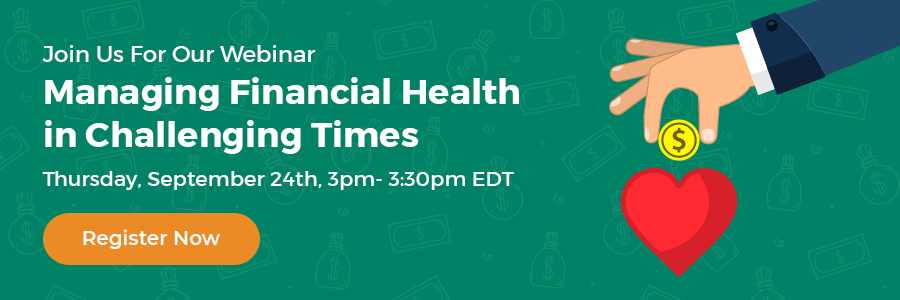
Are you among the more than two million Canadians who are seeking debt relief due to the COVID-19 crisis? Are you among the many others who are facing bad debt as a result of pandemic-related unemployment or underemployment? Or are you among those already experiencing debt trouble for any number of other reasons as COVID-19 lingers? Whatever your circumstances, all of us at Credit Canada Debt Solutions want you to know there are still reasons – and ways – to keep your chin up and your head down money-wise.
The Latest: Financial Assistance and Employment Opportunities in Canada
The following news and resources show that despite COVID-19, you can still try to get a grip on your employment situation, household finances, and personal debt.
COVID-19 Is Weakening and Canada’s Job Market Is Strengthening
September has brought us two pieces of very positive news. First, the COVD-19 storm is weakening at a good pace. Second, Canada’s job market continues to grow stronger as the pandemic winds down, offering more employment opportunities. Bloomberg News reported in mid-August that Canada had regained 55% of three million jobs lost to COVID-19, with almost 1.8 million people returning to work.
Ottawa Has Extended Its Unemployment Benefits Programs
The Government of Canada recently announced that it would be extending benefits to the jobless through new Employment Insurance (EI) benefits switched up from the Canada Emergency Response Benefit (CERB) program.
CERB will be extended by an additional four weeks to a maximum of 28 weeks. This means that, for those who exhausted their CERB benefits at the end of August, an additional month of support is being provided as the switch to new EI benefits gets underway.
As to the new EI benefits, they will now “be available to more Canadians, including those who would not have qualified for EI in the past, adding more than 400,000 people into the program. Those receiving EI will be eligible for a taxable benefit rate of at least $400 per week, or $240 per week for extended parental benefits, and regular benefits will be accessible for a minimum duration of 26 weeks,” the government announced.
Canada Adds to Its Economic Response Plan
Canada has recently announced three new benefits as part of the country’s Economic Response Plan that will provide debt relief to Canadians:
- The Canada Recovery Benefit (CRB), which provides $400 per week for up to 26 weeks, to workers who are self-employed or are not eligible for EI and who still require income support and who are available and looking for work.
- The Canada Recovery Sickness Benefit (CRSB), which provides $500 per week for up to two weeks, for workers who are sick or must self-isolate for reasons related to COVID-19.
- The Canada Recovery Caregiving Benefit (CRCB), which provides $500 per week for up to 26 weeks per household, for eligible Canadians unable to work because they function as caregivers to family and children.
For full details about all of the above government programs, check out canada.ca, where you will find Canada’s COVID-19 Economic Response Plan. It also sheds light on child benefits, tax credits, mortgage support, and more.
Deferred Payments Offering Debt Relief May Be Extended
We know that throughout the pandemic, millions of Canadians have been deferring mortgage, credit card payments, and other debts. Considerations are being made to extend deferrals, which could provide additional relief.
Regardless of whether this comes to fruition, you should check out Credit Canada’s free, half-hour webinar, COVID-19 & Your Finances: Credit Card Payment Deferrals. If you’re in a payment deferral program or considering one, it will give you all the information you need. It’s available through our COVID-19 Financial Resource Centre. Once you’re there, you’ll find our other free Webinars, such as COVID-19 & Your Finances: Crisis Budgeting, which covers how to budget your way out of any financial crisis.
Canada’s Skills Boost Initiative Could Lead to New Employment Opportunities
Losing a job due to COVID-19 can be a challenge, but may also present opportunity. Now may be the time to explore some new career paths that have always interested you. The Government of Canada offers resources that can further your education while you're unemployed to help you pick up a job in another industry. You can check out the Government of Canada’s Skills Boost initiative here.
If you’re not up for a new career challenge, put yourself to a job hunt by reaching out to those you know (it’s how 80% of new jobs are discovered). Get help from family, friends, friends-of-friends, former co-workers, and former bosses.
Although many industries are still slow-going or at a stop – such as the entertainment, hospitality, and tourism sectors – others are full steam ahead, such as healthcare, manufacturing, delivery services, supermarkets, pharmacies, other essential services, and more.
Professional Credit and Debt Counselling Is Always Available
At Credit Canada, we understand that when you’re struggling with debt, it helps to talk to someone. We encourage you to speak to one of our certified Credit Counsellors by calling 1.800.267.2272.
When you book a free counselling session, we will review your situation and discuss financial assistance options, such as our Debt Consolidation programs, which offer debt relief and stress release! We can also guide you through any concerns you might have about things like deferred credit card or bank payments resulting from COVID-19 (with bills coming due soon enough). We emphasize that as a not-for-profit agency, our counselling is completely free, confidential, and non-judgmental.
Join Us for a Free Financial Webinar on September 24!
The Financial Consumer Agency of Canada (FCAC) will be joining Credit Canada on September 24 from 3:00 PM - 3:30 PM EDT for our free webinar: Managing Financial Health in Challenging Times. Register today for this informative session.
Frequently Asked Questions
Have a question? We are here to help.
What is a Debt Consolidation Program?
A Debt Consolidation Program (DCP) is an arrangement made between your creditors and a non-profit credit counselling agency. Working with a reputable, non-profit credit counselling agency means a certified Credit Counsellor will negotiate with your creditors on your behalf to drop the interest on your unsecured debts, while also rounding up all your unsecured debts into a single, lower monthly payment. In Canada’s provinces, such as Ontario, these debt payment programs lead to faster debt relief!
Can I enter a Debt Consolidation Program with bad credit?
Yes, you can sign up for a DCP even if you have bad credit. Your credit score will not impact your ability to get debt help through a DCP. Bad credit can, however, impact your ability to get a debt consolidation loan.
Do I have to give up my credit cards in a Debt Consolidation Program?
Will Debt Consolidation hurt my credit score?
Most people entering a DCP already have a low credit score. While a DCP could lower your credit score at first, in the long run, if you keep up with the program and make your monthly payments on time as agreed, your credit score will eventually improve.
Can you get out of a Debt Consolidation Program?
Anyone who signs up for a DCP must sign an agreement; however, it's completely voluntary and any time a client wants to leave the Program they can. Once a client has left the Program, they will have to deal with their creditors and collectors directly, and if their Counsellor negotiated interest relief and lower monthly payments, in most cases, these would no longer be an option for the client.







